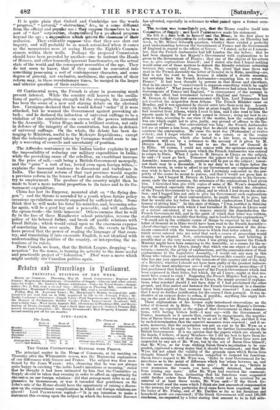.The AfFreedee contumacy on the Indian border explains in part
the impossibility of reducing our military expenditure in India; while the provoking cause of the rebellion, an exorbitant increase in the price of salt,—salt being a British-Government monopoly, and the " price " a sort of tax, levied even upon foreign tribes,— explains the incessant tendency to discontent and turbulence in India. The financial reform of that vast province would require a previous reform in the tenure of land and the relations'of indus- try to employment. The produce of the country might then be made to bear a more natural proportion to its taxes and to its Go- vernment expenditure.
China has lost its Emperor, mounted aloft on "the flying dra- gon " ; and the throne is ascended by a youth whose future policy occasions speculations scarcely supported by sufficient data. Some think that he will make his tutor his minister, and, becoming scho- lar again, will be a good boy and a peaceable, and will authorize the opium-trade—the little innocent! Others surmise that he will fly in the face of those Manchester school principles, reverse the policy of his beloved father, and break off pacific relations with Great Britain ; which would entail upon us the enormous expense of convincing him over again. But really, the events in China have proved that the power of reading the language of that coun- try, and translating it into execrable English, is not identical with -understanding the politics of the country, or interpreting the in- tentions of its rulers.
From Canada we learn, that the British League, dropping " an- nexation " for the nonce, is turning its activity to the more useful and practicable project of " federation." That were a move which might usefully stir Canadian politics again.


























 Previous page
Previous page